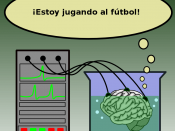1. Introduction
This essay centres around what it means to know something is true and also why it is important to distinguish between what you know and do not or can not know.
The sceptic in challenging the possibility of knowing anything challenges the basis on which all epistemology is based. It is from this attack on epistemology that the defence of scepticism is seen.
2. Strong Scepticism
Strong scepticism states that it is not possible to know anything. That is we cannot have absolute knowledge of anything. This can however immediately have the reflexive argument turned on it and have the question begged of it: "If it is not possible to know anything then how is it you know that nothing is knowable ?". Strong Scepticism is therefore unable to be defended.
3. A Definition of Knowledge
Knowledge can be said to be information that the brain has received that meets a certain set of criteria.
When someone states that they know something they must also believe that, that something is so. If they did not believe in it then how could they take it in as knowledge ?, they would instead be doubtful of it and look for evidence or justification as to why they should believe it.
Secondly for someone to believe in something they must also believe that it is true. If they did not believe that it was true then what is mentioned above would not occur.
So, so far it is decided that knowledge should be true belief. How does one come to the conclusion that something is true however ?. We seek justification. The justification really is the most important part of the criteria because without it one cannot say something is true and therefore cannot say that one believes.
This does however...


